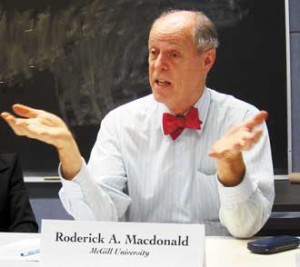
By Pascal Zamprelli
Former McGill Law Dean Roderick Macdonald made history this week when he was elected President of the Royal Society of Canada Nov. 16, making him the first law professor to hold the post. And he would like to make more history by taking the venerable institution to places it has traditionally feared to tread.
At the same time, Graham Bell, an award-winning McGill Biology professor, was named president-elect of the RSC’s Academy of Science. That makes two presidencies for professors from one university, something the Society said is a rare occurrence.
“I am so very proud of both of them,” said Principal and Vice-Chancellor Heather Munroe-Blum. “This is significant recognition of the stature of these two exemplary academics and is yet another example of how McGill shows leadership across all areas of Canadian scholarship and research. On behalf of the University, I congratulate both Prof. Macdonald and Prof. Bell and wish them well as they take up their terms of office at this prestigious organization.”
The Society, which was founded in 1882 and which is based in Ottawa, has a mandate to promote learning and research in the arts and sciences by bringing scholars together to discuss, debate and make recommendations about the major public policy issues with which the country is grappling.
Macdonald, who will assume the post in November 2009, and assist the outgoing President until then, hopes to get more of the Society’s 1,300 members “directly involved in putting together policy positions or giving public lectures, to increase the profile of what contributions intellectual engagement can make to public policy in Canada.”
During his selection process, for example, Macdonald submitted the required vision statement, in which he called on the Society to go “where governments are afraid or loathe to investigate,” and take the lead on some of the more contentious public policy issues.
“There’s an awful lot of work that needs to be done on issues like fetal alcohol spectrum disorder, but everybody’s scared silly of it,” Macdonald said, when asked for an example. “That’s the kind of thing that I hope the Society would get involved with.”
Macdonald hopes to continue the Society’s recent work on supporting young scholars, especially from disadvantaged communities, and wants to get young Canadians thinking more about careers as scholars and researchers. Also, citing the “disproportionate number of standard white European males who are members,” he plans to work toward making the Society’s membership more representative of the country’s diversity.
Currently the F.R. Scott Professor of Constitutional and Public Law, Macdonald is widely considered to be among Canada’s most influential public intellectuals and theorists. He was one of the first to lead legal scholars into interdisciplinary pursuits, exploring dimensions in law through the intellectual contributions of varied fields of study such as philosophy, anthropology, literary theory, semiotics and history.
He noted that there are many familiar faces at the Society, as McGill is among the schools with the highest membership, including no fewer than five other professors from the faculty of law. But he’ll still face substantial challenge of getting the group to pull together.
“You can imaging that getting people who are filmmakers and nuclear physicists in the same room, on the same committee, figuring out where you want to go, is something that you don’t succeed at if what you have is a dictator,” he said, with his trademark mix of wit and humility. “You have to figure out first how to get all these people talking to each other and then focusing on priority items.”
Bell, who earlier this year won an NSERC Award of Excellence and was one of three on the shortlist for the coveted Herzberg medal, is an evolutionary biologist who focuses on biodiversity. Bell could not be reached for comment yesterday.
